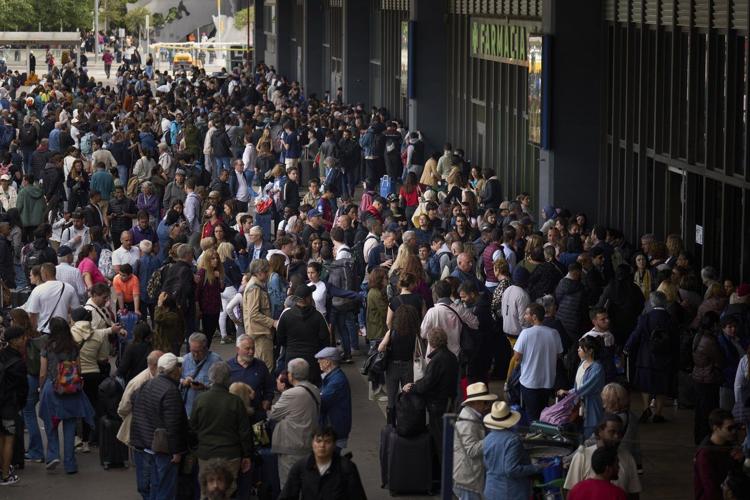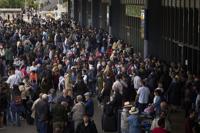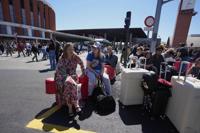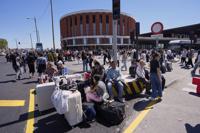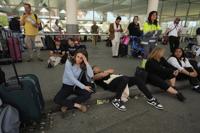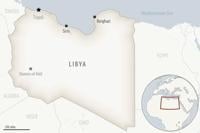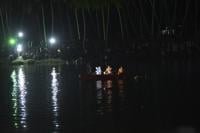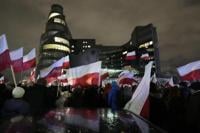BARCELONA, Spain (AP) — Power had almost fully returned to Spain early Tuesday morning as many questions remained about what caused one of Europe’s most severe blackouts that grounded flights, paralyzed metro systems, disrupted mobile communications and shut down ATMs across Spain and Portugal.
By 6:30 a.m., more than 99% of energy demand in Spain had been restored, the country's electricity operator Red Eléctrica said.
Power had returned to several regions across Spain and Portugal as the nations reeled from the still-unexplained widespread blackout that had turned airports and train stations into campgrounds for stranded travelers.
Monday night, many city residents, including in Spain’s capital of Madrid, went to sleep in total darkness. The normally illuminated cathedral spires of Barcelona’s Sagrada Familia Basilica became indistinguishable from the night sky. Streets remained deserted even in neighborhoods where lights flickered back on, as people stayed home after a day of chaos.
“We have a long night ahead,” said when he addressed the European nation late Monday. “We are working with the goal of having power restored to the entire country.”
In Madrid, cheers erupted from balconies where the electricity had returned.
But more than 16 hours after the outage first hit, people all over the Iberian Peninsula were still struggling to call their loved ones, hampered by the loss of mobile phone service.
Stranded overnight at train stations and airports
As metro service stopped, train stations cleared out and shops and offices closed, and thousands of people spilled onto the streets of Madrid. Some resorted to hitchhiking. Others walked hours just to get home.
Spanish national TV broadcast images of commuters clambering out of stalled trains in unlit tunnels.
Emergency workers in Spain said they rescued some 35,000 passengers stranded along railways and underground. By 11 p.m., there were still 11 trains backed up by the power loss awaiting evacuation, Sánchez said.
Uncertainty about when power might return fueled frustration and anxiety in major cities.
“We feel unsafe, unsure, we don’t know what to do,” said Curt Muriel, a French tourist with her husband and two kids who fled the darkened subway and managed to hail a rare cab to Madrid's city center from the airport.
The blackout turned sports centers, train stations and airports into makeshift refuges late Monday.
“We were in the north of Portugal and did get any notifications until we got here because of internet outage,” said Ian Cannons, a British tourist trying to get home who was forced to spend the night in Lisbon's airport. "We can’t book any hotels. Nothing.”
The Barcelona municipality distributed 1,200 cots to indoor recreation centers to host residents with no way to get home and international travelers left in limbo. All over Barcelona and Madrid, people were sleeping on train station benches and floors.
Cash and radios in high demand
As internet and mobile phone services blinkered offline across Spain and Portugal, battery-powered radios flew off the shelves. Those fortunate enough to find service shared whatever news updates they could with strangers on the street.
Lines snaked out of the few supermarkets running on backup generators in Barcelona and Lisbon as people stocked up on dried goods, water and battery-powered flashlights and candles. Clerks counted euros by hand, since many cash registers had stopped working.
Hector Emperador, picking his kids up from school in Barcelona, said he resorted to raiding his sons' piggybank to ensure he had cash on hand after ATMs and some online-banking services shut down. “The coronavirus pandemic will be nothing compared to this,” he said.
Few gas stations were operating, sending the drivers who dared navigate without traffic lights scrambling for fuel. Residents with electric door keys found themselves locked out of their homes.
The many inconveniences became a threat to survival for those with medical needs like refrigeration for insulin or power for dialysis machines and oxygen concentrators. Some hospitals — but not all — stayed open with the help of generators.
Cause Unknown
Officials did not say what caused the blackout, the second such serious European power outage in as many months after a fire at Heathrow Airport shut down Britain’s busiest travel hub on March 20.
They said there was little precedent for this kind of widespread electric failure across all of the Iberian Peninsula, with a combined population of some 60 million. Across the Mediterranean Sea, Spain’s Canary Islands, Balearic Islands and the territories of Ceuta and Melilla were spared.
“We have never had a complete collapse of the system,” Prime Minister Sánchez said, explaining how Spain’s power grid lost 15 gigawatts, the equivalent of 60% of its national demand, in just five seconds.
In his televised address late Monday, Sánchez said that authorities were still investigating what happened. Portugal’s ���ϳԹ��� Cybersecurity Center threw cold water on feverish speculation about foul play, saying there was no sign that the outage resulted from a cyber attack.
Speaking to reporters in Brussels, Teresa Ribera, an executive vice president of the European Commission, also ruled out sabotage. Nonetheless, the outage “is one of the most serious episodes recorded in Europe in recent times,” she said.
___
Associated Press writer Suman Naishadham in Madrid and video journalist Helena Alves in Lisbon, Portugal contributed to this report.

